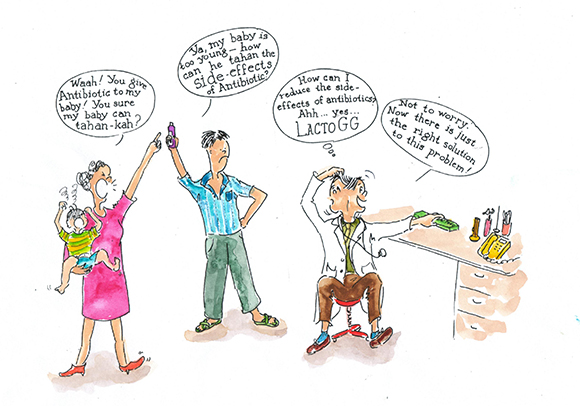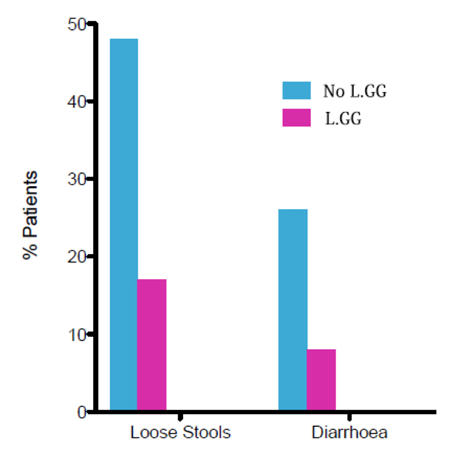|
 During illness, in the weeks after an illness or after a course of antibiotics the intestinal microbial balance is lost. Scientists have documented that a short course of antibiotic can disturb a patientРђЎs ecological balance of microorganisms by nearly 1 month or even longer. Our bodyРђЎs good germs are responsible for maintaining a balanced and healthy immune system. By constantly stimulating the immune cells in our gut, our Рђўin-houseРђЎ intestinal bacteria are, to a large extent, responsible for generating a strong immune system. When the ecological balance of our good germs is disrupted by antibiotics, our ability to maintain immune defence is also disrupted. The ecological upset brought about by antibiotics triggers many of the side-effects of antibiotics such as diarrhoea, РђўwindyРђЎ abdomen, loss of appetite or feeling generally Рђўworn outРђЎ. The side-effects of antibiotics are especially noticeable in babies and children. Sometimes РђўbadРђЎ germs, fungi and yeasts can even take advantage of the disrupted microbial ecosystem to overrun and invade our bodies. To overcome this problem, doctors make use of LACTOGG┬« to prevent the side-effects of antibiotics and to ensure rapid re-establishment of the bodyРђЎs microbial balance when a person falls ill. Even when ANTIBIOTICS are prescribed LACTOGG┬« will act as the patient's PROBIOTIC. Studies have shown that Lactobacillus GG can survive in the presence of many of the commonly prescribed antibiotics, such as erythromycin and amoxycillin. Doctors had tried to make use of yoghurt to reduce antibiotic-associated diarrhoea but it did not help. Clinical studies found that LACTOGG┬«РђЎs specific probiotic strain can reduce gastrointestinal side-effects of antibiotics by about 70%. 
% of patients suffering from symptoms associated with antibiotic use [Vanderhoof et al. 1999]
Taking LACTOGG┬« ensures that the intestinal bacteria are less disturbed by antibiotics. Since a balanced ecosystem of good germs is essential in maintaining a strong immune system, LACTOGG┬«РђЎs ability to conserve the natural balance of good germs safeguards oneРђЎs immunity despite the use of antibiotics. How should LACTOGG┬« be taken? Babies, children and adults: At least 1 capsule or 1 sachet a day throughout the course of antibiotic and for at least 1 week after the end of the course of antibiotic. Depending on the type and course of antibiotic prescribed, the amount of LACTOGG┬« may be increased. For best effects in preventing disturbance of the microbial ecosystem, consume LACTOGG┬« before commencing antibiotics, for as long as antibiotics are taken and then for at least 1 week after antibiotics are completed. LACTOGG┬« should be consumed 1-2 hours apart from your dose of antibiotic. For example, if the dose of antibiotic is at 12 noon, LACTOGG┬« may be consumed anytime before 10 or 11 am and anytime after 1 or 2 pm. References: Armuzzi A et al. The effect of oral administration of Lactobacillus GG on antibiotic-associated gastrointestinal side-effects during Helicobacter pylori eradication therapy. Aliment Pharmacol Ther 2001;15:163-169 Arvola T et al. Prophylactic Lactobacillus GG reduces antibiotic-associated diarrhoea in children with respiratory infections: a randomized study. Pediatrics 1999;104(5):e64 Cresci G et al. Lactobacillus GG and Tributyrin supplementation reduce antibiotic-induced intestinal injury. J Parenter Enteral Nutr 2013;37:763-774 Korpela K et al. Lactobacillus rhamnosus GG intake modifies preschool children's intestinal microbiota, alleviates penicillin-associated changes, and reduces antibiotic use. PLoS ONE 2016;11(4):e0154012 Vanderhoof JA et al.Lactobacillus GG in the prevention of antibiotic-associated diarrhoea in children. J Pediatr 1999;135:564-568 Szajewska H et al. Probiotics in the prevention of antibiotic-associated diarrhea in children: A meta-analysis of randomized controlled trials. J Pediatr 2006;149:367-372 Myllyluoma E et al. Probiotic supplementation improves tolerance to Helicobacter pylori eradication therapy РђЊ a placebo-controlled, double-blind randomized pilot study. Aliment Pharmacol Ther 2005;21:1263-1272 Johnston BC et al. Probiotics for the prevention of pediatric antibiotic-associated diarrhea. Cochrane Database Syst Rev 2011;11:CD004827 DРђЎSouza AL et al. Probiotics in prevention of antibiotic associated diarrhoea: meta-analysis. BMJ 2002;324:1361-1366 |




